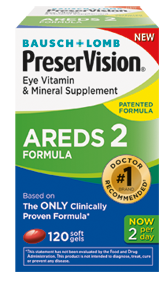Maintaining Healthy Eyes with Vitamins
The American Optometric Association recognizes these 5 vitamins as crucial to maintaining the health of your eyes:
Supplementing these vitamins is not necessary if you have a well-balanced diet.
Vitamins for Patients with Macular Degeneration
Vitamins for macular degeneration have been studied and vetted by the AREDS and AREDS2 scientific studies. Our clinic recommends these vitamins for anyone who has or is at risk of macular degeneration. There are several brands of macular degeneration vitamins, all of which are good. Here is a short overview of the differences between them:
PreserVision Full ARED formula. Good for anyone, especially smokers because there's no vitamin A. Some patients prefer not to take PreserVision because you must take it four times a day to get the entire dose, but newer versions of PreserVision only have to be taken twice a day.
Full ARED formula. Good for anyone, especially smokers because there's no vitamin A. Some patients prefer not to take PreserVision because you must take it four times a day to get the entire dose, but newer versions of PreserVision only have to be taken twice a day.
iCAPs
Soft gels you take just 2 a day. Comes in multi-vitamin form so it can replace your current multi-vitamin. Also comes in 1x a day formula, but this form does not contain the full dose and is not recommended by our clinic. Smokers should be careful not to take iCAPs that contain vitamin A.
Ocuvite
A popular choice because the entire dosage is in just one pill a day, but much like the 1x a day iCAPs formula, Ocuvite doesn't give you as much vitamin as is recommended by the ARED study.
ARED's (Macular Degeneration) Ingredients & Risks
Lutein, zeaxanthin, green leafy vegetables (kale and spinach), vitamin C, E, Omega 3, Zinc. Large amounts of Vitamin E carry the risk of hemorrhagic strokes and increased risk of prostate cancer.
Vitamins for Other Ocular Disease
Not all these vitamins have been clinically proven to be significantly effective in patients and should be taken with caution. Let your doctors know which vitamins you are taking.
| Dry Eye | Omega 3, vitamin A. But smokers should not take vitamin A. |
| Retinitis Pigmentosa | Vitamin A. But smokers should not take vitamin A. |
| Cataracts | Lutein, Zeaxanthin, green leafy vegetables (kale and spinach), vitamin C, E, Zinc, Selenium. |
| Kerataconus | B2 (riboflavin) |
| Diabetic Retinopathy | B6 (pyridoxine), Omega 3, Zinc, rutin. |
| CRVO | B6 (pyridoxine) |
| Eyelash Health | B7 (biotin) |
| Glaucoma | B12 (cobalamin), chromium, ginkgo, melatonin |
| Night Vision | Zinc, bilberry |
| Graves Dz | Selenium |
| Optic Nerve Disease | Ginkgo |
In our office, we frequently recommend vitamins for dry eye and macular degeneration but not for other ocular diseases. Taking vitamins is never a suitable alternative to regular visits to your medical professional and following their treatment plan.
